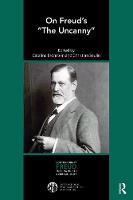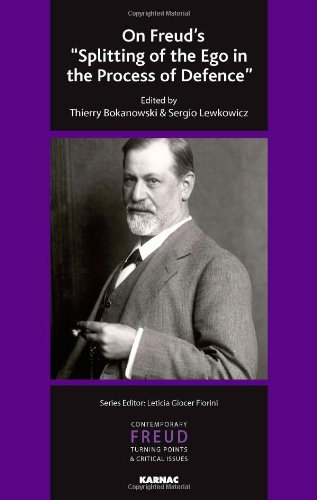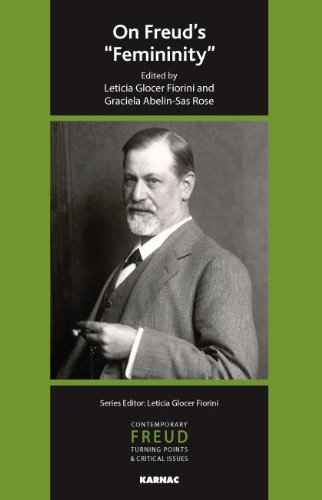On Freud's "On Beginning the Treatment"
Part of IPA - Contemporary Freud Turning Points and Critical Issues series - more in this series

Book Details
- Publisher : Routledge
- Published : 2012
- Cover : Paperback
- Pages : 224
- Category :
Psychoanalysis - Catalogue No : 32005
- ISBN 13 : 9781780490267
- ISBN 10 : 1780490267
Also by Christian Seulin
On Freud’s "The Uncanny"
Price £36.99
There are currently no reviews
Be the first to review
Like his other papers on technique, Freud's 1913 essay "On beginning the treatment" had an enduring influence on psychoanalysts for generations to come, providing them with a solid and worldwide-accepted conceptual basis on how to initiate psychoanalytic treatments. After a century of clinical experience and theoretical research, are all of Freud's rules and advice still valid today?
Christian Seulin and Gennaro Saragnano have asked ten eminent analysts to comment upon this seminal paper of Freud's, each of them focusing on one of the fundamental issues originally propounded by the "father of psychoanalysis". The result is an overall and careful view on the actuality of the technical bases of analysis, in what can be considered a good introduction to contemporary psychoanalytic theory and practice.
Reviews and Endorsements
On beginning the treatment (1913) is one of the most important of Freud's technical articles, a theme he examined between 1904 and 1918. This text, which sets out the basis of the treatment and the conditions of psychoanalysis, still provides a solid reference for the analytic practice. Far from a group of rigid rules, Freud spoke of the technique as an art, thinking always of the singularity of each case, even if the fundamental methods of free association and suspended attention specify the psychoanalytical method that differentiates it from the suggestion.
In this book, ten eminent analysts, coming from different schools of psychoanalytic thought, confront the contemporary technical proposals to the freudian precepts. The book reexamines, in the light of the latest advances in the analytic practice, such important questions as: the conditions of starting an analysis today; tranference and associativity; the play of the person of the analyst and intersubjectivity; the fundamental rule enunciation in contemporary practice; the conditions and functions of the interpretation; and the energetic drives in action during the treatment.
Contributors:
Alice Becker Lewkowicz, Hugo Bleichmar, Marie-France Dispaux, Antonino Ferro, Theodore Jacobs, Lewis A. Kirshner, Sergio Lewkowicz, Norberto Marucco, Patrick Miller, René Roussillon, Gennaro Saragnano, Christian Seulin, Rogelio Sosnik
'The original title in German of this seminal work, in its full version, was reproposed as it was in the English translation by Joan Riviere of 1924. Subsequently, it was shortened in the version for the Standard Edition: On Beginning the Treatment", as Strachey explains in his presentation of the Freudian text, was the first part of a trilogy that included The Question of the First Communications and The Dynamics of the Cure. Seeing it as a trilogy that goes beyond the beginning of the treatment returns the work to its original importance. Although Freud protects himself by using the metaphor of the game of chess, his "recommendations" (not rules) lay the bases for what today we still consider to be the fundamental characteristics of the psychoanalytical method. All the circumstances - and there are several - that advise us not to ask for "any unconditional acceptance" of the recommendations, do not prevent the author from establishing a procedure "to set in motion a process". In psychoanalysis, everything is played out between these two elements: the method and the process, i.e. the instruments that set in motion the process and the process itself. The reader of this book will find that the authors of the various chapters have carefully explored the possibilities offered by a contemplation of the method that crosses Freud's entire life until chapter VI of An Outline of Psychoanalysis. Only by working hard on the method and its raisons d'être will we be able in the future - as we were in the past - to broaden the therapeutic possibilities of psychoanalysis.'
- Jorge Canestri, MD, psychiatrist and psychoanalyst, training and supervising analyst for the Italian Psychoanalytic Association and for the Argentine Psychoanalytic Association
About the Editor(s)
Christian Seulin is Training and Supervising Analyst of the Paris Psychoanalytical Society (SPP), member of the International Psychoanalytical Association. He is former Secretary of the Training Committee of the Lyon's Institute of the SPP and former Secretary of the Executive Council of the Training Commission of the SPP. Living and practising in Lyon, he is currently President of the Lyon's group of the SPP. He authored more than fifty articles and book's chapters and one book.
More titles by Christian Seulin
Gennaro Saragnano, MD, is a member and former Secretary of the Italian Psychoanalytical Association and psychiatrist and psychoanalyst in private practice in Rome. He was the Editor of the Bulletin of the Italian Psychoanalytical Association from 2000 to 2007. He served the International Psychoanalytical Association as a member of the Website Editorial Board from 2005 to 2009, and he has been a member of the Publications Committee of the International Psychoanalytical Association since 2009. He was appointed Chair of the Publications Committee during the Mexico City IPA Congress in August 2011.
Customer Reviews
Our customers have not yet reviewed this title. Be the first add your own review for this title.
You may also like
Night Vision: Wilfred Bion's Epistemological Poetics and the Experience of the...
Dominic Angeloch
Price £26.09
save £2.90









